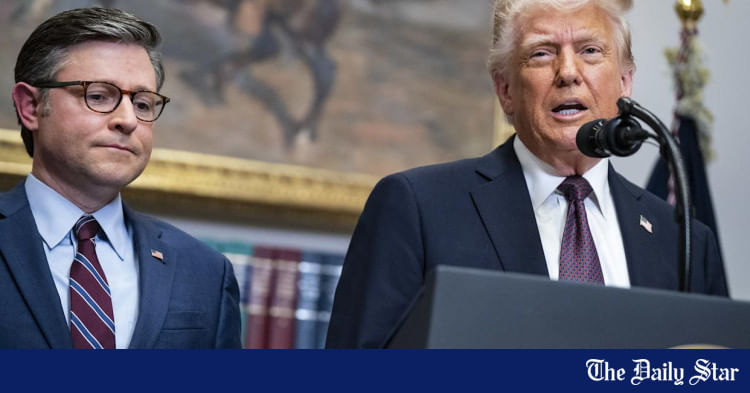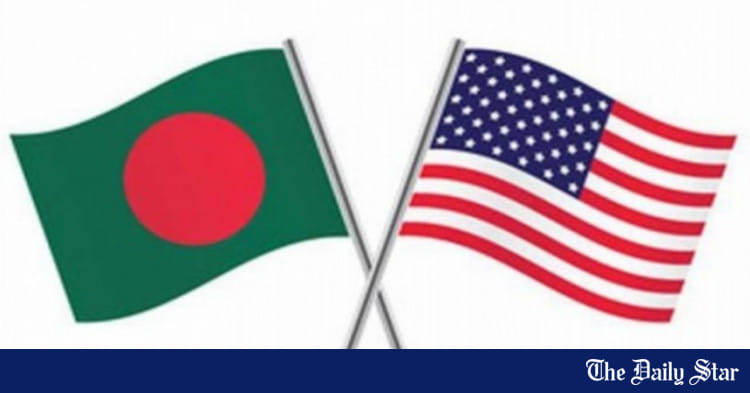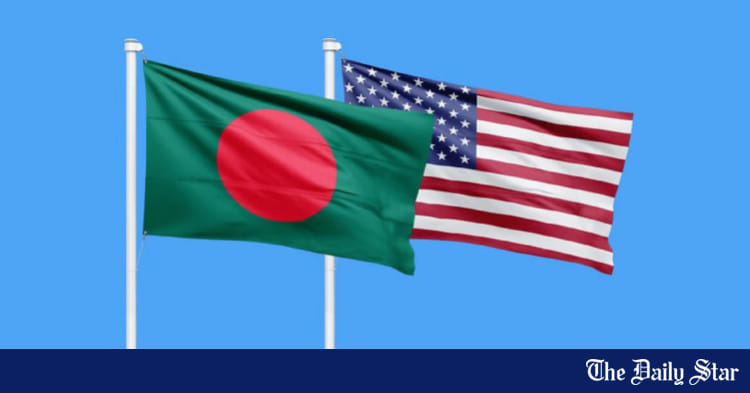- Copy to clipboard
- Thread starter
- #101
Saif
Senior Member
- Joined
- Jan 24, 2024
- Messages
- 15,397
- Reaction score
- 7,874
- Nation

- Residence

- Axis Group


Economists urge FTA talks with US to safeguard $8.0b exports
Bangladesh needs to pursue a strong, evidence-based negotiation and proactively initiate a Free Trade Agreement (FTA) with the US in response to President Donald Trump's declaration of higher tariffs, to safeguard its $8 billion export market in the country. Additionally, comprehensive polic
Economists urge FTA talks with US to safeguard $8.0b exports
FE REPORT
Published :
Apr 18, 2025 00:36
Updated :
Apr 18, 2025 00:36

Bangladesh needs to pursue a strong, evidence-based negotiation and proactively initiate a Free Trade Agreement (FTA) with the US in response to President Donald Trump's declaration of higher tariffs, to safeguard its $8 billion export market in the country.
Additionally, comprehensive policy measures are needed to boost export earnings from the US and other countries by diversifying markets and enhancing competitiveness rather than relying on increased imports from the US to address trade imbalances.
These remarks came from experts, economists and representatives of the private sector on Thursday from a dialogue titled "Trump Reciprocal Tariffs and Bangladesh: Implications and Response" organised by the Centre for Policy Dialogue (CPD) at a hotel in the capital.
Professor Rehman Sobhan, Chairman of CPD, delivered special commentary, while Professor Mustafizur Rahman, a distinguished fellow at CPD, presented a keynote paper at the event chaired by Dr Fahmida Khatun, Executive Director of the host organisation.
Md Fazlul Hoque, former President of BKMEA, Dr Mostafa Abid Khan, former Member of the Bangladesh Tariff and Trade Commission, Md Mahbub ur Rahman, CEO of HSBC Bangladesh, Shams Mahmud, President of the Bangladesh Thai Chamber of Commerce and Industry, and Taslima Akter Lima, President of Bangladesh Garments Sramik Sanghati spoke, among others.
Mr Rehman Sobhan said that China is the main target of President Donald Trump as it is the world's largest economy in terms of purchasing power parity (PPP) and holds the highest competitiveness both domestically and globally.
The trade war would create opportunities for boosting export from Bangladesh to China, he said, adding that China-despite being the largest garment exporter to the US-exports around $17 billion annually, significantly more than Bangladesh's $7.0 billion.
Facing a 145 per cent tariff, export from China to the US could drop to nearly zero, while countries like Bangladesh, Vietnam and Cambodia may fill the $17 billion gap, he said. The prominent economist also recommended not to provide any additional facilities for the US in trade and said any concessions for any country must be extended to all countries under the MFN principle.
He said Bangladesh should carefully craft its policy responses, prioritizing export promotion to alternative markets-especially the EU, where it enjoys duty-free access-while enhancing competitiveness to tap into markets like Australia, Canada, and Japan.Professor Mustafizur Rahman stressed the importance of enhancing regional trade partnerships, strengthening South-South cooperation, and strategically positioning Bangladesh amid the potential global trade realignment triggered by the new tariff regime.
Laying stress on evidence-based negotiations, he said Bangladesh collects $180 million annually in duties on US imports at 6.2 per cent average, but it drops to $64 million or 2.2 per cent after rebates. On the other hand, Bangladesh pays $1.08 billion in duties on exports to the US at 15.2 per cent of tariff, added Mustafizur Rahman.
He said Bangladesh would be in a favourable position in negotiations with the US on tariff rates but would likely face major challenges regarding non-tariff barriers, intellectual property rights, labour standards, and related other issues.
He anticipated that the new US tariffs would significantly harm global trade and the US itself, noting that while the full impact remains uncertain, US consumers, buyers, and exporters will be affected.
He said that the effect of the tariff on Bangladesh would depend on the extent of tariff, its duration, and the range of products covered, adding that much would also hinge on how a country responds within the 90-day window after receiving a concession.
He emphasised the need for bilateral negotiation and said the Trade and Investment Cooperation Forum Agreement (Ticfa) would be the key platform for discussion, which needs to be activated through a scheduled meeting.
In that forum, the government must ask which items the US is interested in and assess the potential revenue loss if those items are offered to others, he said.
He undermined the letter issued by Chief Adviser Dr Muhammad Yunus offering free trade access of several items like gas turbines, semiconductors and medical equipment. He said that offering zero tariffs to the US would require similar concessions for other countries under MFN rules of the WTO.
Mustafizur Rahman underscored the importance of signing an FTA with the US to offer exclusive concessions and urged the government to prioritize certification, standardization, and the intellectual property rights (IPR) regime-acknowledging these would be challenging.
However, he noted that the US has FTAs with countries like Costa Rica, the Dominican Republic, Bahrain, and Jordan-none of which are highly developed-suggesting that Bangladesh could also secure one through effective negotiation.
Citing the USTR report, he pointed to US concerns over high tariffs, weak IPR protections, labour standards, and bureaucratic hurdles in Bangladesh, stressing that these issues must be resolved to attract both US and global investment.
It is extremely difficult to respond effectively to the US demand for a balanced trade, as importing goods worth $7 billion within just three months is quite impossible, said Mostafa Abid Khan.
He added that even if Bangladesh reduces tariffs on a particular product, it is not guaranteed that exports from the US to Bangladesh will increase.
Shams Mahmud expressed concern that the massive tariff has disrupted the local supply chain, with some orders held back and clients seeking discounts. He added that local businesses are facing cash flow issues and feared increased harassment by the NBR as they try to meet revenue targets.
Md Fazlul Haque said that the actions of the Trump administration are like an unknown disease-no economist has been able to identify its nature.
"As a result, we are uncertain about what may happen to us. We are not sure which measure will work to resolve this issue," he said.
Babul Akter, General Secretary of the Bangladesh Garment and Industrial Workers Federation, urged the government to provide targeted support to US-exporting factories and avoid using the situation to shut down struggling factories, which could lead to widespread unemployment.
FE REPORT
Published :
Apr 18, 2025 00:36
Updated :
Apr 18, 2025 00:36
Bangladesh needs to pursue a strong, evidence-based negotiation and proactively initiate a Free Trade Agreement (FTA) with the US in response to President Donald Trump's declaration of higher tariffs, to safeguard its $8 billion export market in the country.
Additionally, comprehensive policy measures are needed to boost export earnings from the US and other countries by diversifying markets and enhancing competitiveness rather than relying on increased imports from the US to address trade imbalances.
These remarks came from experts, economists and representatives of the private sector on Thursday from a dialogue titled "Trump Reciprocal Tariffs and Bangladesh: Implications and Response" organised by the Centre for Policy Dialogue (CPD) at a hotel in the capital.
Professor Rehman Sobhan, Chairman of CPD, delivered special commentary, while Professor Mustafizur Rahman, a distinguished fellow at CPD, presented a keynote paper at the event chaired by Dr Fahmida Khatun, Executive Director of the host organisation.
Md Fazlul Hoque, former President of BKMEA, Dr Mostafa Abid Khan, former Member of the Bangladesh Tariff and Trade Commission, Md Mahbub ur Rahman, CEO of HSBC Bangladesh, Shams Mahmud, President of the Bangladesh Thai Chamber of Commerce and Industry, and Taslima Akter Lima, President of Bangladesh Garments Sramik Sanghati spoke, among others.
Mr Rehman Sobhan said that China is the main target of President Donald Trump as it is the world's largest economy in terms of purchasing power parity (PPP) and holds the highest competitiveness both domestically and globally.
The trade war would create opportunities for boosting export from Bangladesh to China, he said, adding that China-despite being the largest garment exporter to the US-exports around $17 billion annually, significantly more than Bangladesh's $7.0 billion.
Facing a 145 per cent tariff, export from China to the US could drop to nearly zero, while countries like Bangladesh, Vietnam and Cambodia may fill the $17 billion gap, he said. The prominent economist also recommended not to provide any additional facilities for the US in trade and said any concessions for any country must be extended to all countries under the MFN principle.
He said Bangladesh should carefully craft its policy responses, prioritizing export promotion to alternative markets-especially the EU, where it enjoys duty-free access-while enhancing competitiveness to tap into markets like Australia, Canada, and Japan.Professor Mustafizur Rahman stressed the importance of enhancing regional trade partnerships, strengthening South-South cooperation, and strategically positioning Bangladesh amid the potential global trade realignment triggered by the new tariff regime.
Laying stress on evidence-based negotiations, he said Bangladesh collects $180 million annually in duties on US imports at 6.2 per cent average, but it drops to $64 million or 2.2 per cent after rebates. On the other hand, Bangladesh pays $1.08 billion in duties on exports to the US at 15.2 per cent of tariff, added Mustafizur Rahman.
He said Bangladesh would be in a favourable position in negotiations with the US on tariff rates but would likely face major challenges regarding non-tariff barriers, intellectual property rights, labour standards, and related other issues.
He anticipated that the new US tariffs would significantly harm global trade and the US itself, noting that while the full impact remains uncertain, US consumers, buyers, and exporters will be affected.
He said that the effect of the tariff on Bangladesh would depend on the extent of tariff, its duration, and the range of products covered, adding that much would also hinge on how a country responds within the 90-day window after receiving a concession.
He emphasised the need for bilateral negotiation and said the Trade and Investment Cooperation Forum Agreement (Ticfa) would be the key platform for discussion, which needs to be activated through a scheduled meeting.
In that forum, the government must ask which items the US is interested in and assess the potential revenue loss if those items are offered to others, he said.
He undermined the letter issued by Chief Adviser Dr Muhammad Yunus offering free trade access of several items like gas turbines, semiconductors and medical equipment. He said that offering zero tariffs to the US would require similar concessions for other countries under MFN rules of the WTO.
Mustafizur Rahman underscored the importance of signing an FTA with the US to offer exclusive concessions and urged the government to prioritize certification, standardization, and the intellectual property rights (IPR) regime-acknowledging these would be challenging.
However, he noted that the US has FTAs with countries like Costa Rica, the Dominican Republic, Bahrain, and Jordan-none of which are highly developed-suggesting that Bangladesh could also secure one through effective negotiation.
Citing the USTR report, he pointed to US concerns over high tariffs, weak IPR protections, labour standards, and bureaucratic hurdles in Bangladesh, stressing that these issues must be resolved to attract both US and global investment.
It is extremely difficult to respond effectively to the US demand for a balanced trade, as importing goods worth $7 billion within just three months is quite impossible, said Mostafa Abid Khan.
He added that even if Bangladesh reduces tariffs on a particular product, it is not guaranteed that exports from the US to Bangladesh will increase.
Shams Mahmud expressed concern that the massive tariff has disrupted the local supply chain, with some orders held back and clients seeking discounts. He added that local businesses are facing cash flow issues and feared increased harassment by the NBR as they try to meet revenue targets.
Md Fazlul Haque said that the actions of the Trump administration are like an unknown disease-no economist has been able to identify its nature.
"As a result, we are uncertain about what may happen to us. We are not sure which measure will work to resolve this issue," he said.
Babul Akter, General Secretary of the Bangladesh Garment and Industrial Workers Federation, urged the government to provide targeted support to US-exporting factories and avoid using the situation to shut down struggling factories, which could lead to widespread unemployment.
















